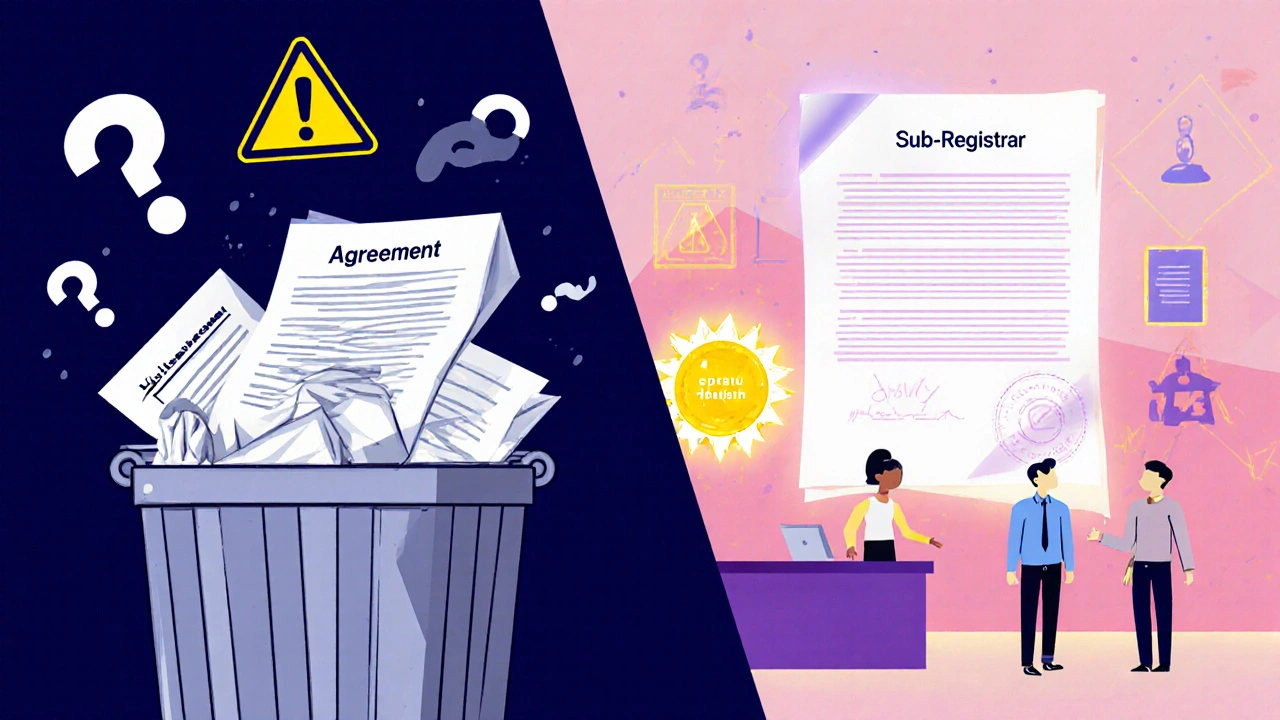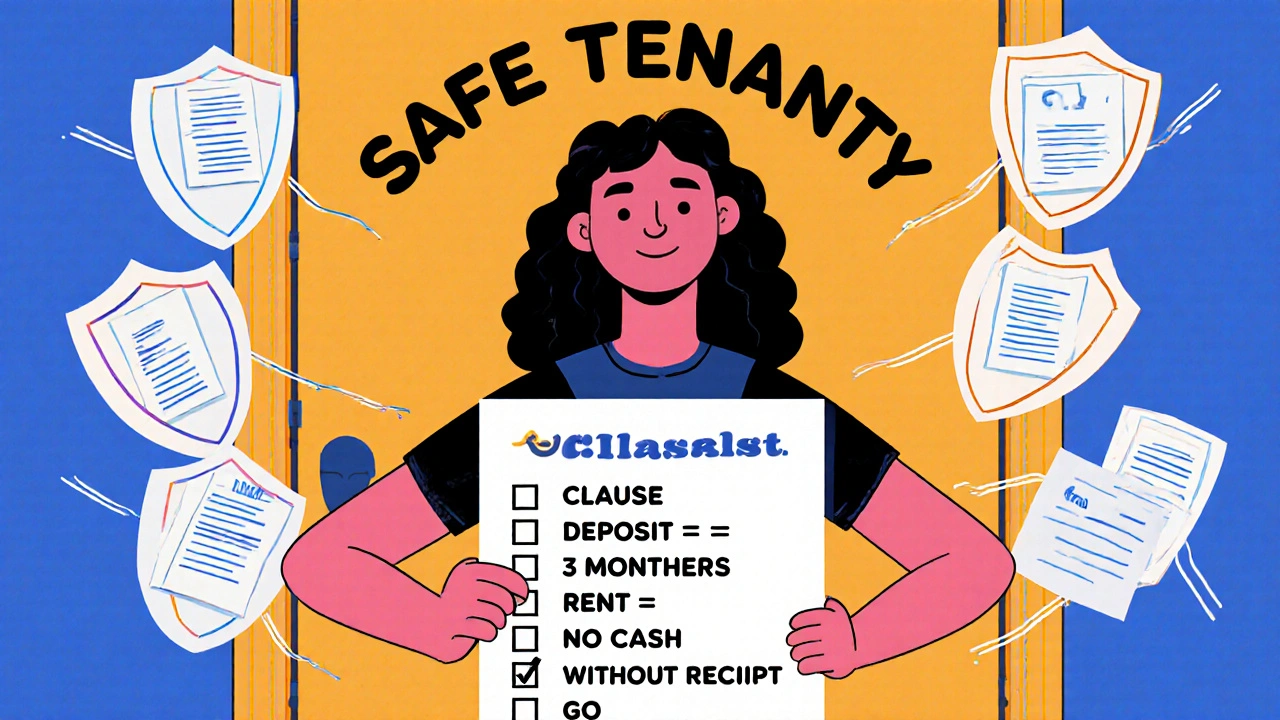Rent Agreements in India: Essential Clauses and Registration Requirements
 Nov, 7 2025
Nov, 7 2025
Signing a rent agreement in India isn’t just a formality-it’s the difference between a smooth tenancy and a legal nightmare. Many tenants and landlords skip the details, assuming a handshake or a simple note is enough. But in India, a poorly written rental agreement can lead to eviction disputes, deposit losses, or even court cases. The law doesn’t protect people who don’t have the right paperwork.
Why a Written Rent Agreement Matters
Oral agreements might work for a short stay in a guesthouse, but for any rental longer than 11 months, Indian law requires a written contract. The Registration of Documents Act, 1908 makes it mandatory to register agreements lasting more than a year. Even if your lease is for 12 months or longer, skipping registration means you lose legal standing. Courts won’t enforce an unregistered agreement, no matter how fair it seems.Think of it like car insurance. You hope you never need it, but if something goes wrong, you’re glad you had it. A proper rent agreement protects both sides. Landlords get proof of rent payments and rules around damage. Tenants get security against sudden rent hikes or eviction without notice.
Must-Have Clauses in Every Rent Agreement
Not all clauses are created equal. Some are optional. Others are non-negotiable under Indian law. Here’s what every agreement must include:- Full names and addresses of both landlord and tenant-no nicknames or initials.
- Property details-complete address, flat number, floor, and any included amenities like parking or furniture.
- Rent amount and payment schedule-exact figure, due date (e.g., 5th of every month), and accepted modes (bank transfer, check, UPI).
- Security deposit-amount, how it’s held, and conditions for return. By law, it can’t exceed three months’ rent for residential properties.
- Lease duration-start and end date. If it’s a rolling agreement, state the notice period (usually 15-30 days).
- Use of property-specify if it’s for residential use only. No commercial activity unless agreed in writing.
- Maintenance and repairs-who pays for what. Minor repairs (like bulb changes) usually fall to the tenant. Major issues (leaks, electrical faults) are the landlord’s responsibility.
- Utilities-list which ones (electricity, water, internet) are included and which the tenant pays directly.
- Termination conditions-how either party can end the lease early, and what penalties apply.
- Subletting rules-if allowed, under what conditions. Most agreements forbid it without written consent.
One clause people forget: dispute resolution. Add a line saying disputes will be settled in the jurisdiction where the property is located. This prevents landlords from dragging tenants to court in another city.
Registration: What It Really Means
Registration isn’t just stamp paper and signatures. It’s a legal record filed with the Sub-Registrar’s Office. Here’s how it works:- Both parties sign the agreement on non-judicial stamp paper. The value depends on the state and rent amount. In Maharashtra, for example, stamp duty is 5% of total rent for the lease period.
- Visit the nearest Sub-Registrar’s Office with original ID proofs (Aadhaar, passport), property title documents, and two witnesses.
- Pay the registration fee-usually 1% of the total rent or ₹1,000, whichever is higher.
- Receive a stamped, registered copy. Keep two originals-one for each party.
Registration takes 3-7 days. You can track it online in most states using the property’s document number. Without registration, the agreement is still valid for 11 months or less-but beyond that, it’s unenforceable in court.

What Happens If You Don’t Register?
Some landlords avoid registration to dodge taxes. Tenants go along because it’s cheaper upfront. But the risks are real.If a tenant stops paying rent, the landlord can’t legally evict them without a registered agreement. The tenant can stay for months-even years-without paying, and the landlord has no legal recourse. Meanwhile, the tenant has no protection either. If the landlord sells the property, the new owner can demand you leave immediately, even if you’ve paid rent on time.
And here’s the kicker: unregistered agreements can’t be used as evidence in court. That means no claim for deposit return, no proof of agreed rent, no basis for compensation for damages.
Common Pitfalls and How to Avoid Them
Here are the top mistakes people make:- Using generic templates-online templates often ignore state-specific rules. Kerala’s rules differ from Tamil Nadu’s. Always tailor the agreement to your state.
- Not checking property ownership-make sure the landlord owns the property. Ask for the title deed or latest property tax receipt.
- Accepting cash without receipts-always get a signed receipt for every rent payment. Even if you pay via UPI, keep the transaction ID and a written acknowledgment.
- Ignoring inventory lists-include a signed list of furniture, appliances, and their condition. Photos help too. This avoids disputes over damage claims later.
- Signing without reading-don’t rush. If a clause says “landlord can increase rent anytime,” walk away.
Pro tip: In cities like Delhi, Mumbai, and Bengaluru, many property managers now use digital agreements with e-signatures and e-stamping. These are legally valid under the Information Technology Act, 2000, as long as they’re registered and meet state stamp duty rules.

Tenant Rights You Can’t Be Forced to Give Up
Even if the agreement says otherwise, some rights are protected by law:- You can’t be evicted without a court order-even if you’re late on rent.
- Landlords can’t cut off water, electricity, or gas to force you out.
- Security deposit must be returned within 14 days of vacating, minus legitimate deductions (with receipts).
- Rent increases must be agreed upon in writing before the lease renews.
- You have the right to a habitable property. If there’s a structural issue, the landlord must fix it within a reasonable time.
Many tenants don’t know this: if a landlord violates these rights, you can file a complaint with the local Rent Control Authority or Consumer Forum. No lawyer needed.
What to Do If Your Landlord Refuses to Register
If your landlord says, “It’s too expensive” or “We’ve never done it before,” here’s how to respond:- Explain that registration protects them too. If you leave suddenly or damage the property, they can’t claim anything without proof.
- Offer to split the registration cost. It’s often less than one month’s rent.
- Suggest using a digital platform like StampIndia or e-Stamping services available in most states. These reduce paperwork and cost.
- If they still refuse, consider walking away. A landlord who avoids legal compliance is a risk.
There’s no shame in choosing a property with a registered agreement. It shows the landlord is organized, trustworthy, and respects the law.
Next Steps: Checklist Before Signing
Before you put your signature on the dotted line:- Verify the landlord’s ownership with the property tax receipt or sale deed.
- Confirm the agreement includes all 10 essential clauses.
- Check the stamp paper value matches your state’s rules.
- Ensure both parties sign on every page.
- Get two witnesses to sign (they must carry ID proof).
- Go to the Sub-Registrar’s Office together to register.
- Keep your copy in a safe place-digitally backed up too.
If you’re renting for less than 11 months, registration isn’t mandatory-but you still need a written agreement. Oral agreements are risky even for short stays. A simple one-page document with key terms is better than nothing.
Is a rent agreement mandatory in India?
Yes, for any lease longer than 11 months. The Registration of Documents Act, 1908 requires written and registered agreements for leases over a year. Shorter tenancies don’t require registration, but a written agreement is still strongly advised to avoid disputes.
Can a landlord increase rent during the lease term?
No, unless the agreement specifically allows it. Most agreements fix the rent for the entire term. Any increase must be mutually agreed upon in writing before the lease renews. Unilateral rent hikes are illegal and can be challenged in court.
How much is the security deposit allowed in India?
For residential rentals, the law limits the security deposit to no more than three months’ rent. Some states, like Maharashtra, enforce this strictly. For commercial properties, the limit is higher and negotiable, but still should be reasonable.
What if I pay rent in cash without a receipt?
You’re at serious risk. Without a receipt, there’s no proof you paid. If the landlord claims you defaulted, you can’t prove otherwise. Always get a signed receipt with date, amount, and signature-even for UPI or bank transfers. Keep screenshots and receipts for at least two years.
Can I sublet my rented apartment?
Only if the agreement explicitly allows it. Most residential leases prohibit subletting without the landlord’s written consent. Even if you find someone reliable, subletting without permission can lead to eviction. Always ask in writing before bringing in another tenant.
